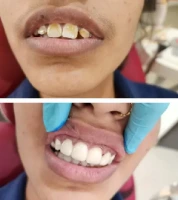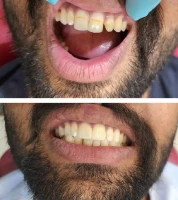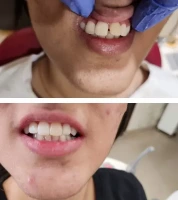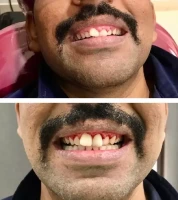Call us
+919650935061Address
Nirman Nagar, JaipurGoogle Rating
5.0( 607+ Reviews )

Overview
What is Porcelain Veneers?

Overview
What is Porcelain Veneers?
Porcelain Veneers are artificially made tooth-coloured shells that are set over the teeth to make them appear fuller and more perfect. Any aesthetic imperfections, such as tooth cracks, chipped teeth, or even stains, can be covered using porcelain veneers in Jaipur. These veneers are custom-made to fit the patient and set over the front surface of the teeth. These are usually made from porcelain and other materials, deriving its name. Moreover, it is most commonly performed on the top front eight teeth, including the incisors.
Signs That you Need
What are the Signs That you Need Porcelain Veneers?
Porcelain veneers in Jaipur might not be for everyone. Hence, it is important to know when to have veneers. Here are the signs that you might need porcelain veneers:
Aesthetic Concerns
If you are unhappy with the way your smile looks or have aesthetic concerns about your dental appearance, consider having porcelain veneers. These not only offer a seamless fit but also look natural.
Cracked or Chipped Teeth
If your teeth are damaged, cracked, or chipped, you could consider porcelain veneers. This treatment provides durability and keeps teeth looking healthy and strong.
Stained Teeth
In the case of extremely stained teeth that do not seem to be cured with whitening agents, veneers could come in handy. These artificial teeth covers come in various shapes, sizes and colours.

Extreme Gap Between Teeth
Gaps between teeth can be frustrating aesthetically and functionally as well. Veneers can be put on to cure this and help the patient regain better functionality with the teeth as well as have better-looking teeth set.
Worn Down Teeth
If your teeth are worn down due to natural causes or dental trauma, you can opt for veneers. With a quick consultation with your dentist, you can determine what size and shape of veneers would give you back your original dental appeal.
Misaligned or Uneven Teeth
If your teeth are misaligned or uneven, you can customise porcelain or resin-based veneers to make them look healthy, flawless and in alignment for a perfect smile. You can decide what type of veneers to use with a dental consultation.

Aesthetic Concerns
If you are unhappy with the way your smile looks or have aesthetic concerns about your dental appearance, consider having porcelain veneers. These not only offer a seamless fit but also look natural.
Cracked or Chipped Teeth
If your teeth are damaged, cracked, or chipped, you could consider porcelain veneers. This treatment provides durability and keeps teeth looking healthy and strong.
Stained Teeth
In the case of extremely stained teeth that do not seem to be cured with whitening agents, veneers could come in handy. These artificial teeth covers come in various shapes, sizes and colours.
Extreme Gap Between Teeth
Gaps between teeth can be frustrating aesthetically and functionally as well. Veneers can be put on to cure this and help the patient regain better functionality with the teeth as well as have better-looking teeth set.
Worn Down Teeth
If your teeth are worn down due to natural causes or dental trauma, you can opt for veneers. With a quick consultation with your dentist, you can determine what size and shape of veneers would give you back your original dental appeal.
Misaligned or Uneven Teeth
If your teeth are misaligned or uneven, you can customise porcelain or resin-based veneers to make them look healthy, flawless and in alignment for a perfect smile. You can decide what type of veneers to use with a dental consultation.
Health Tips
Your Guide to a Healthier Smile
Our health tips video is given below which gives you a guide and practical advice to maintain a healthy smile. Learn expert tips from Dr. Renu on oral hygiene, preventive care, and nutrition to keep your teeth strong and bright every day.

15+ Years of Experience

Meet Our Doctor
Dr. Renu Chaudhary
BDS, MDS & PGCOI(PGI)
Dr. Renu Chaudhary offers expert and affordable solutions to dental issues and has over 15 years of experience in the field. While her treatments are pain-free and guided with extreme attention to detail, she also ensures that the comfort of the patient is maintained. Whether it is cosmetic procedures, treating tooth and gum ailments or providing veneers for perfect yet natural-looking teeth, she offers all. She has been performing as the best dentist for veneers in Jaipur and has conducted over 20,000 dental procedures, including cosmetic treatments. Above all, she prioritises the convenience of the patients over anything else, keeping them satisfied throughout the process.
20K+
Dental Procedures
10K+
Smile Makeovers
20K+
Happy Patients
Why Choose
Why Choose Dr. Renu Dental Clinic for Porcelain Veneers?
Dr. Renu Dental Clinic has been a top porcelain veneer treatment clinic in Jaipur for a long time. The patients leave satisfied and happy with their treatments at the clinic. Here’s why:
Years of Experience
Dr. Renu, at her clinic, offers over 15 years of experience in dealing with patients with dental ailments. She has performed cosmetic procedures and preventive surgeries successfully and painlessly.
Advanced Clinic
The clinic houses some of the best and most advanced dental equipment to use. These ensure that the tests run smoothly, the diagnoses are accurate, and the procedures are pain-free and safe.
Affordable Pricing
The pricing offered for procedures at the Dr. Renu Dental Clinic in Jaipur is affordable for most people.
Years of Experience
Dr. Renu, at her clinic, offers over 15 years of experience in dealing with patients with dental ailments. She has performed cosmetic procedures and preventive surgeries successfully and painlessly.
Advanced Clinic
The clinic houses some of the best and most advanced dental equipment to use. These ensure that the tests run smoothly, the diagnoses are accurate, and the procedures are pain-free and safe.
Affordable Pricing
The pricing offered for procedures at the Dr. Renu Dental Clinic in Jaipur is affordable for most people.
What are the Types of Porcelain Veneers?
- 1. Composite Veneers
Composite veneers are used to correct certain minor dental concerns or flaws. Usually, in such cases, the dentist may apply a tooth-coloured material such as resin to cover up the irregularities, cracks, or stains.
- 2. Porcelain Veneers
Porcelain veneers in Jaipur are custom-made veneers prepared to make teeth appear better and flawless. They are restorative in nature and are meticulously prepared by the dentist to fit seamlessly over damaged teeth. However, at first, a layer of enamel is removed from the teeth to make the veneers fit better.
- 3. No-prep Veneers
No-prep veneers are an easier solution for people with imperfect teeth who do not want to remove the enamel layer invasively. In this procedure, a very small amount of enamel is scrapped off to make space for veneers.
- 4. Removable Veneers
Removable veneers or pop-on veneers also provide coverage for teeth imperfections. However, as the name suggests, they are removable and can be put back on as needed by the patient. These are a relatively new type of veneers and can sometimes cause difficulty eating.
- 5. Lumineers
Lumineers are also a type of porcelain veneer, but they are much thinner than standard porcelain veneers. They are also less durable. However, on the brighter side, they require less prep work than other veneers.
What is the Procedure for getting Porcelain Veneers?
Getting porcelain veneers often starts off with a dentist’s recommendation, after which the patient decides on the ideal treatment based on the options and proceeds with it. Here is a more detailed description of the procedure:
- Step 1: Initial Consultation
The journey of getting porcelain veneers in Jaipur starts with scheduling a consultation at a dentist’s clinic. This helps assess the patient’s needs and determine the best possible veneer type. During this time, several tests will also be run.
- Step 2: Treatment Plan
After the consultation, the dentist evaluates the test results and devises a custom-made treatment plan for the patient. This plan often includes the types and numbers of veneers required and the steps involved in the process.
- Step 3: Preparing the Teeth
During a new visit to the dentist, the teeth are prepared for veneers. This process often includes removing a thin layer of enamel, which is often about 0.5 mm in width. Impressions of the teeth are taken and then sent to the dental lab to make veneers.
- Step 4: Temporary veneers
As the patient waits for the permanent veneers to be made and placed on the teeth, the temporary veneers may be put on to check the fit. This also gives a preview of the actual look with veneers.
- Step 5: Veneer Bonding
Once the veneers are made and placed on the teeth, the dentist checks for fit and colour match to ensure a natural look. Then, the teeth are cleaned and polished for bonding. Bonding is done with a special cement that acts as an adhesive between the teeth and the veneers.
- Step 6: Final Adjustments
After the veneers are bonded, the dentist often makes subtle adjustments to the teeth and porcelain veneers to ensure a perfect fit and bite. Patients also receive a set of guidelines on how to use the veneers properly.
What are the Signs That you Need Porcelain Veneers?
Porcelain veneers in Jaipur might not be for everyone. Hence, it is important to know when to have veneers. Here are the signs that you might need porcelain veneers:
- 1. Aesthetic Concerns
If you are unhappy with the way your smile looks or have aesthetic concerns about your dental appearance, consider having porcelain veneers. These not only offer a seamless fit but also look natural.
- 2. Cracked or Chipped Teeth
If your teeth are damaged, cracked, or chipped, you could consider porcelain veneers. This treatment provides durability and keeps teeth looking healthy and strong.
- 3. Stained Teeth
In the case of extremely stained teeth that do not seem to be cured with whitening agents, veneers could come in handy. These artificial teeth covers come in various shapes, sizes and colours.
- 4. Extreme Gap Between Teeth
Gaps between teeth can be frustrating aesthetically and functionally as well. Veneers can be put on to cure this and help the patient regain better functionality with the teeth as well as have better-looking teeth set.
- 5. Worn Down Teeth
If your teeth are worn down due to natural causes or dental trauma, you can opt for veneers. With a quick consultation with your dentist, you can determine what size and shape of veneers would give you back your original dental appeal.
- 6. Misaligned or Uneven Teeth
If your teeth are misaligned or uneven, you can customise porcelain or resin-based veneers to make them look healthy, flawless and in alignment for a perfect smile. You can decide what type of veneers to use with a dental consultation.
Transform Your Smile with Expert Dental Care!
Let’s Request a Schedule For Consultation
Book AppointmentWhat are the Things to Know Before You Get Porcelain Veneers?
Before getting dental veneers treatment in Jaipur, having enough knowledge about the entire process is a must. Here are other things that you should be aware of as well:
- 1. They are Removable
Dental veneers are fixed in place using a special cement-like adhesive. Depending on the patient’s requirements, they can also be removed. However, this should only be done by a dentist in a dental clinic.
- 2. They can Crack
Dental veneers, though durable, can chip and crack like natural teeth. Hence, it is important to take care of them to prevent dental trauma and improve dental health.
- 3. Veneers are Not Required for the Entire Mouth
Veneers do not have to cover the entire mouth or the entire teeth set. They are often made for specific teeth that require such dental procedures. Usually, the front eight teeth are most common in veneer fittings.
- 4. Veneers can Fix a Lot of Issues
Veneers are able to solve a lot of dental issues, such as perfecting a smile, giving back the natural radiance of the teeth, or even making the teeth look fuller and more healthy.
- 5. Temporary Veneers are Available
Certain types of veneers are temporary in nature and can be removed without an extensive procedure by the dentist. Such veneers are often called snap-on or removable veneers and are relatively newer than other veneer products.
- 6. Porcelain Veneers can Resist Stains
Porcelain veneers and resin-based veneers are two varieties of artificial dental covers available in the market. However, porcelain veneers are better at resisting stains than other veneer types.
What to Expect During Porcelain Veneers Procedure?
Porcelain Veneers for a smile makeover are life-changing for some people. While the results are great, the procedure can be a little confusing for people who are new to it. Here is what to expect:
- 1. Consultation
At first, the dentist usually examines the patient and their dental health, checking for dental irregularities and requirements. It is after this that the veneer treatment is planned.
- 2. Impressions
Impressions will be created on the teeth that require the veneers using dental equipment. This helps them customise the dental veneer kit. This does not take a lot of time and is painless.
- 3. Checking the Fit
Temporary veneers will be put on to check the fitting and the look of the veneers. Any changes required by the patient will be implemented in this stage.
- 4. Scrapping Off Enamel
Before putting on the veneers, a small layer of the enamel of the teeth will be scraped off. This ensures that the surface of the teeth is uneven and can better hold the veneer.
- 5. Bonding
The veneer bonding is done using dental cement, which is put on the prepared tooth, and then the veneer is set on top of it. This is hardened, and then the veneers are ready. This is painless as well.
- 6. Aftercare
A set of guidelines is usually provided to the patient to better care for the veneers after they leave the clinic. Routine checkups are, however, necessary to ensure the veneers stay intact.
How Long Does Porcelain Veneers Last?
Porcelain veneers last about 15-20 years with proper dental care and hygiene. These artificial layers put on top of the teeth usually last for a decade or more, but they can get damaged in that time as well. If you notice any cracks developing in the veneers, be sure to reach out to your dentist.
In addition, regular brushing and flossing are required to maintain porcelain veneers. Routine dental checkups help as well. In fact, to get the stains off the veneers that may develop after some while, you can get a dentist’s appointment, too.
What are the Benefits of Porcelain Veneers?
Porcelain veneers in Jaipur have a lot of benefits, including aesthetic restoration and providing healthier teeth for mouth function. Here are the advantages in detail:
- 1. Enhances Smile
Using veneers enhances the aesthetic appeal of the teeth and mouth as a whole. People can smile better and more confidently, and their teeth can look fuller and appear healthier.
- 2. Increases Durability
In the case of worn-out or damaged teeth, veneers can act as a protective layer above the natural teeth. This increases the durability of the entire teeth set and helps keep it strong for a long time.
- 3. Solves Many Dental Issues
Veneers help resolve many dental issues, including supporting worn-out teeth, making smiles better, layering over and protecting damaged teeth, and even hiding irregularities in the dental domain.
- 4. Low Maintenance
Veneers, in comparison with other dental treatments, are low maintenance and do not require frequent medical attention to keep them in shape. That being said, it is also important to note that they require proper oral hygiene to last long.
- 5. Safe Materials
Dental veneers are made from safe and non-toxic materials like porcelain and resin-based materials that pose no threat to the body and its immune system. In addition, veneers mimic the natural teeth, so they look normal to others as well.
- 6. Increases Functionality
With stronger and more durable teeth due to the veneer layering, people can eat better food and bite harder food. This increases the overall functionality of the mouth.
What are the Alternatives of Porcelain Veneers?
Although porcelain veneers are often a great choice for people and their dental ailments, they may not be for everyone. Hence, here are the alternatives for porcelain veneers:
- 1. Crown
Crowns are designed to strengthen the damaged teeth or decaying teeth by covering the whole treated tooth. This is like a dental cap custom-made to fit over the tooth to provide durability.
- 2. Implants
Implants are considered when some of the teeth are missing, and veneers cannot help. Artificial teeth are designed to fit in the place of the missing piece and replace them like natural teeth.
- 3. Teeth Bonding
Teeth bonding is a procedure that is performed on teeth that are chipped, uneven or discoloured. The tooth-coloured composite material is applied to the teeth, and no enamel is removed, unlike in veneers.
- 4. Braces
Braces are a popular treatment option for teeth that are misaligned. Although veneers can also help in similar cases, braces are often suited for severely misaligned teeth and have proven to be effective.
- 5. Invisalign
Aligners are put on the teeth under this orthodontics procedure to protect and straighten the misaligned teeth for the patients. Unlike veneers, which make the teeth look straight and normal, these aligners are capable of changing the position of misaligned teeth.
- 6. Teeth Whitening
Although veneers are also used to layer up the teeth with white teeth-like material, they do not whiten the actual natural teeth underneath. However, in teeth whitening treatment, natural teeth are brightened at low costs.
How to Take Care of Porcelain Veneers?
Porcelain veneers in Jaipur are an excellent option for people with damaged or uneven teeth. Here is how to take care of them after getting them on:
- 1. Maintain Oral Hygiene
After getting porcelain veneers, it is important to maintain oral hygiene to increase the longevity of the artificial layers. In addition, this keeps them from getting stained easily as well.
- 2. Use Soft Toothbrush
Since porcelain veneers are not as strong as natural teeth, the best way to care for them might be to use a soft toothbrush and a dentist-recommended toothpaste.
- 3. Routine Checkup
Going regularly to the dentist for routine checkups keeps the porcelain veneers in good shape and also prevents any dental issues from happening in the mouth.
- 4. Check for Gum Disease
Gum diseases can happen very quickly if the oral hygiene of the mouth is not maintained properly. This can cause the gums to retreat further back from the teeth. Hence, getting checked up for this is important.
- 5. Avoid Chewing on Hard Objects
Even though veneers provide additional strength to the teeth and are durable, they are not as strong as the natural teeth. Thus, chewing on hard objects like biting on nails or eating ice cubes should be avoided.
- 6. Avoid Grinding or Clenching Teeth
Grinding or clenching teeth is a habit that should be stopped by patients with veneers since this can damage the porcelain veneers. They may be worn down or can chip at the ends.
What are the Limitations of Porcelain Veneers?
Porcelain veneers in Jaipur might be one of the best ways to regain a perfect smile. However, there are certain limitations of porcelain veneers, such as:
1. Some Enamel is Lost
When putting on veneers, the dentist usually scraps off a thin layer of enamel to make the surface rougher and better accommodate the veneers. This causes the natural teeth to lose the enamel layer.
2. Many Veneers are not Reversible
A lot of the veneers, including the porcelain veneers and composite veneers, are permanent and are not reversible. In fact, veneers can go upto a decade or more without requiring a replacement or dentist intervention.
3. Teeth May Become Sensitive
Putting on veneers may cause them to become sensitive to varying temperatures. You may find it hard to eat hot or cold foods. In such a case, consult a dentist or get a sensitivity-controlling toothpaste.
4. Veneers May Get Damaged
Veneers are not as strong as the real teeth, which makes them susceptible to damage. In case of clenching or grinding your teeth or biting on hard surfaces, your veneers may get chipped at the ends.
5. Insurance May Not Cover it
Since veneers are a cosmetic procedure, many insurance companies do not cover them often. Though the expenses of getting veneers are not as high as those of other dental procedures, they still could pose some financial burdens.
6. Jaw Pain
Sometimes, while getting veneers, the patients may feel a subtle jaw pain that should subdue within a day or two. If the pain persists, it is wise to consult a dentist.
Cost of Getting Porcelain Veneers in Jaipur
Cosmetic veneers in Jaipur are often budget-friendly and painless procedures for most. Here are more details on the porcelain veneer cost per tooth in Jaipur:
- 1. The Dentist’s Expertise
The experience of the dentist and, in return, the expertise they carry in dealing with dental ailments and related cosmetic procedures often determines the price of the treatment. In the case of Dr. Renu Dental Clinic, she offers over 15 years of experience to her patients.
- 2. Number of Teeth
The price of getting the veneers also depends on the number of teeth that are to be treated. Usually, the costs are calculated based on the teeth being treated.
- 3. Type of Veneers
There are many types of veneers available, including composite and porcelain veneers. The type of veneers also has an impact on the cost of the treatment since certain veneers tend to be more expensive than others.
- 4. Location of the Clinic
The location of the clinic may also influence the price of the treatments. Usually, the clinics located in bigger cities and metropolitan areas tend to charge more; however, Dr. Renu Dental Clinic offers affordable veneers cost in Jaipur.
See the Transformation
Remarkable Results with Dr. Renu Dental
See real patient transformations with personalized care. Explore stunning Before & After results at Dr. Renu Dental.
Testimonial (Google Reviews)
Patient Feedback on Google
Here is what our happy patients say on Google about Dr. Renu Dental & Multi Speciality services their visit experience and the results of offered treatments.
Vipin Khandelwal
I had an excellent experience at Dr. Renu Dental Clinic. The staff is incredibly friendly and professional, creating a welcoming and comfortable environment. Dr. Renu's expertise and gentle approach made the treatment smooth and pain-free. They take the time to explain procedures and answer questions, which is truly reassuring. Highly recommend this clinic for anyone seeking quality dental care!
Anshul Kayath
It was really a good experience at Dr. Renu's dental clinic. She treated our daughter's tooth cavity and pulpotomy done by her was painless. Best dental clinic in the area.
V.K h.k
I visited Dr. Renu Dental Clinic for a teeth whitening and smile makeover and couldn’t be happier with the results. Dr. Renu is the best cosmetic dentist in Jaipur, and her attention to detail is impeccable. My teeth are now brighter, and my smile looks better than ever. I highly recommend Dr. Renu for cosmetic dentistry services.
Jyoti
I recently had a root canal procedure and capping of the tooth done at Dr Renu's dental clinic, and I couldn’t be more pleased with the experience. Dr. Renu and her entire staff were exceptional. From the moment I walked in, I was greeted with warmth and professionalism. The procedure was explained thoroughly, and Dr. Renu ensured I was comfortable throughout. The entire team demonstrated great expertise and care, making a potentially stressful experience quite pleasant. The follow-up care has been impeccable, and I’m delighted with the results. I highly recommend Dr.Renu and her team for anyone seeking top-notch dental care."
FAQs
Everything You Need to Know
At our clinic, patient satisfaction and trust are our top priorities. Dr. Renu Chaudhary.
Dental veneers treatment in Jaipur is a cosmetic procedure that enhances your smile by covering imperfections like stains, gaps, and misaligned teeth. Porcelain veneers for a smile makeover are custom-made thin shells that improve the appearance, shape, and color of teeth.
Porcelain veneers last around a decade and sometimes more, with certain veneers going up to two decades. To enhance the longevity of the veneers, it is essential to keep dental hygiene in check. Porcelain veneers in Jaipur are highly durable and can last 10-15 years with proper care, including: Good oral hygiene Avoiding excessive pressure on teeth (e.g., biting hard objects) Regular dental checkups at a trusted veneers specialist in Jaipur
A porcelain veneer is an artificial layer made to cover the natural tooth in case of damage or any other irregularities. It is made out of porcelain-based material and put on in a dental clinic.
Porcelain veneers in India usually range between Rs. 9000 to Rs. 20,000 per tooth, with certain types of veneers being even pricier. The total price of the treatment depends on the number of teeth and the type of veneers used.
Veneers are not painful to get. They often require the patient to visit the dentist for a few visits to get the consultation, impression and finally, the veneers without any pain.
No. The veneers in themselves might not smell, but not maintaining proper oral hygiene might cause them to grow bacteria and smell. Thus, flossing and brushing regularly are essential.
No, veneers do not look fake. They are similar in appearance, colour and material to the natural teeth and, hence, do not appear artificial to other people.
Absolutely! However, veneers are not as strong as natural teeth and should only be used to chew soft food. Harder food could damage the veneers.
Yes. Veneers can be brushed on, and it is recommended that oral hygiene is maintained through regular brushing. But using a soft toothbrush and a dentist-suggested toothpaste is always better.
If you are looking for the best clinic for dental veneers near me in Jaipur, visit Dr. Renu Dental Clinic for expert care. Our best dentist for veneers in Jaipur specializes in porcelain veneers treatment for a perfect smile.
The porcelain veneers cost per tooth in Jaipur varies based on: Material quality (porcelain, composite, etc.) Number of veneers required Customization & procedure complexity For an accurate estimate, visit Dr. Renu Dental Clinic for a consultation on affordable veneers cost in Jaipur.
The porcelain veneers procedure in Jaipur is minimally invasive and virtually painless. Our best dentist for veneers in Jaipur ensures a comfortable and stress-free experience with advanced techniques.
Yes! Dr. Renu Dental Clinic offers smile makeovers with porcelain veneers in Jaipur, transforming your smile by correcting discoloration, gaps, and uneven teeth.
To book a consultation at the best porcelain veneers treatment clinic in Jaipur, contact Dr. Renu Dental Clinic, Contact Us.
If you're looking for the best dental hospital for veneers treatment in Jaipur, visit Dr. Renu Dental Clinic, known for advanced cosmetic dentistry, expert porcelain veneers treatment, and affordable smile makeovers. Our clinic provides state-of-the-art dental care with a team of experienced specialists ensuring high-quality results.











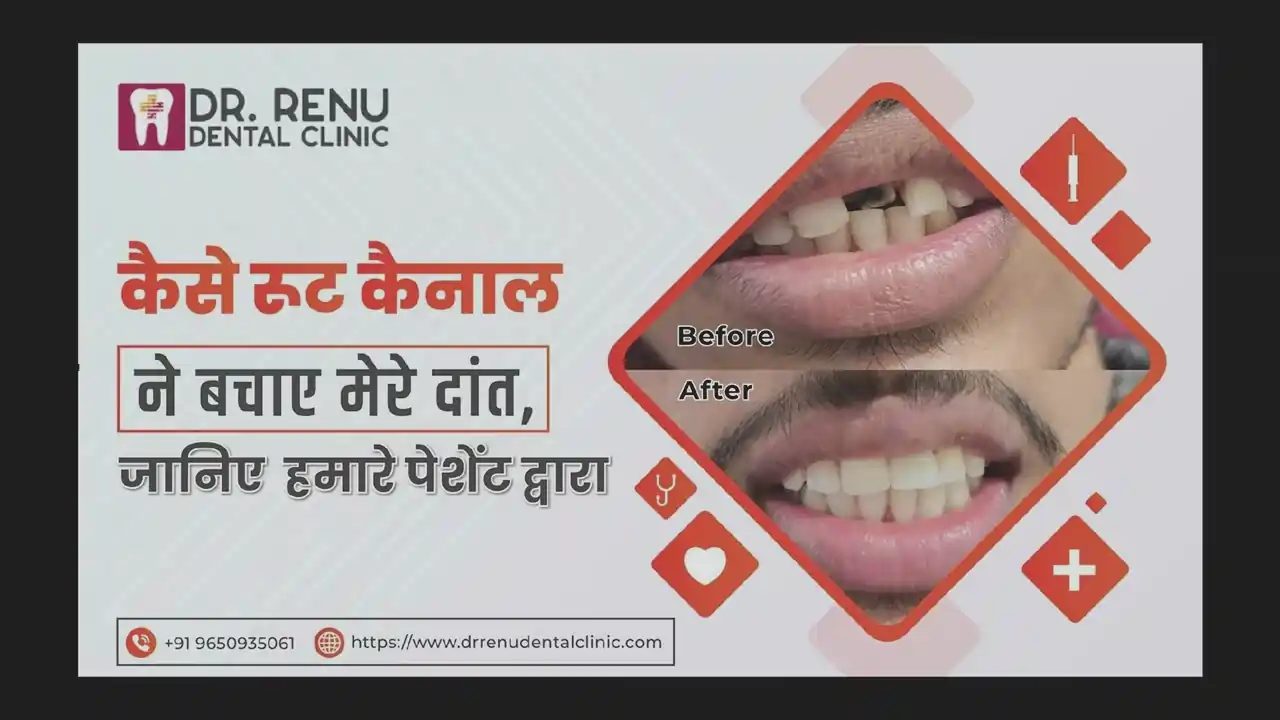


 Facebook
Facebook
 Instagram
Instagram

